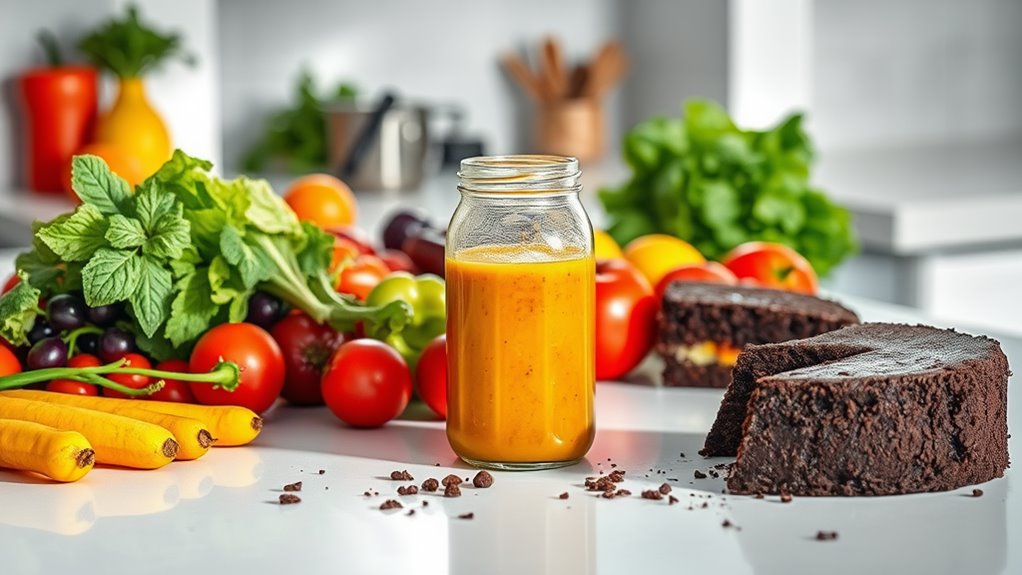No Willpower. This Trick Helps You Stick to Any Diet!
Sticking to a diet can feel like an uphill battle, especially when willpower seems to vanish at the worst moments. But what if you could make healthier choices without relying solely on that fleeting strength? Imagine pairing your morning coffee with a nutritious breakfast or creating a space filled with tempting, healthy snacks. This isn’t about strict rules; it’s about making small changes that add up. Ready to discover how to turn those little tweaks into lasting habits?
Understanding the Role of Willpower in Dieting
When you think about sticking to a diet, willpower often feels like the secret sauce that can make or break your journey. You might wonder how to stay on a diet when temptations are everywhere, but here’s the truth: willpower isn’t the only answer.
It’s easy to feel drained after resisting that piece of cake or skipping fries. Instead, focus on setting realistic goals and finding healthier alternatives you actually enjoy.
Surround yourself with support, whether it’s friends or online communities, and remember that slip-ups happen. Embrace them as learning experiences rather than failures.
When you shift your mindset, you’ll discover that sticking to your diet becomes less about sheer willpower and more about creating a lifestyle you love.
The Concept of Habit-Stacking
Although it might sound a bit unconventional, habit-stacking can be a game changer for sticking to your diet. The idea is simple: you take an existing habit and “stack” a new one on top of it. For example, if you already drink coffee in the morning, you could stack a healthy breakfast right after. This creates a routine that feels natural and effortless.
Here’s a quick table to help you visualize:
| Current Habit | New Habit to Stack | Time of Day |
|---|---|---|
| Drinking coffee | Eating a healthy snack | Morning |
| Brushing teeth | Drinking water | Morning/Evening |
| Watching TV | Doing a quick workout | Evening |
| Going to bed | Reading a diet book | Night |
| Lunch break | Eating a salad | Afternoon |
Stacking makes it easier to stay on track and helps you build healthier habits over time!
Designing Your Environment for Success
Creating a supportive environment can make all the difference in your journey to stick to a diet. Start by filling your kitchen with healthy options, like fruits and veggies, instead of sugary snacks. When you open the fridge, you want to see vibrant, nutritious choices calling your name.
It’s also helpful to set up your dining space to encourage mindful eating; try putting your phone away and sitting down at the table. If you’re snacking, use smaller bowls to help control portions.
You can even enlist friends or family to join you in this lifestyle change, making it a fun challenge. Remember, a little planning goes a long way, and with the right environment, you’re more likely to succeed!
Identifying Triggers and Temptations
As you embark on your diet journey, understanding what triggers your cravings can be a game changer. Identifying these triggers helps you make smarter choices, reducing temptations. Think about when and why you crave unhealthy snacks. Is it boredom, stress, or habit? Knowing this can empower you to resist.
Here’s a simple table to help you pinpoint your triggers:
| Trigger | Response |
|---|---|
| Boredom | Go for a walk |
| Stress | Try deep breathing |
| Social situations | Drink water first |
| Late-night snacking | Set a kitchen curfew |
| Watching TV | Keep healthy snacks handy |
Creating Healthy Alternatives
Finding ways to satisfy your cravings with healthier options can make sticking to your diet feel less like a struggle and more like a fun challenge. Instead of reaching for that sugary snack, try swapping it for fresh fruit or a handful of nuts.
Craving something crunchy? Veggies with hummus can do the trick! You can even get creative in the kitchen—baking sweet potato fries instead of regular ones adds a delicious twist while keeping things nutritious.
When you create these healthy alternatives, it’s not just about cutting calories; it’s about discovering new flavors and enjoying the process. Plus, you’ll feel proud of making smarter choices, and that boost in confidence can help you stick to your goals even more!
The Power of Accountability
When you’re trying to stick to a diet, having someone by your side can make all the difference. Accountability partners can keep you motivated, offer support, and help you stay on track. Whether it’s a friend, family member, or a support group, sharing your goals makes them feel more real. Plus, you can celebrate small victories together!
Here’s a quick look at how accountability can boost your diet success:
| Accountability Type | Benefits | How to Get Started |
|---|---|---|
| Friends | Motivation and support | Share your goals |
| Family | Encouragement and advice | Cook healthy meals together |
| Support Groups | Community and shared tips | Join a local or online group |
With the right support, you’ll find sticking to your diet much easier!
Tracking Progress and Celebrating Small Wins
Tracking your progress can be one of the most rewarding parts of your diet journey, especially since it helps you see just how far you’ve come. When you jot down your meals, workouts, or even your mood, it creates a roadmap of your efforts.
You might be surprised at the small victories—like swapping a donut for a piece of fruit or choosing water over soda. Celebrate these wins! Treat yourself to a movie night or a new book when you hit a milestone.
Remember, it’s not just about the number on the scale; it’s about building healthier habits. So, keep that journal handy, and don’t forget to give yourself a pat on the back for every step forward.
You’ve got this!
Long-Term Strategies for Sustainable Eating Habits
Creating lasting change in your eating habits isn’t just about sticking to a strict diet; it’s about finding a balance that works for you over the long haul.
Start by setting realistic goals—think small, like adding a veggie to each meal instead of cutting out all your favorite snacks. Experiment with cooking new recipes; you might discover healthier versions of your favorites.
Remember, it’s okay to indulge occasionally; the key is moderation. Surround yourself with supportive friends or family, and don’t hesitate to share your struggles.
Keep a food journal to track your feelings and patterns. Lastly, be patient with yourself. Change takes time, and every step counts, even if it feels like a slow crawl.
You’ve got this!





